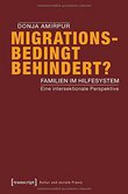Explore

Warum werden Familien an der Schnittstelle von Migration und Behinderung durch die Behindertenhilfe kaum erreicht? Fachliteratur und Wissenschaft scheinen sich einig zu sein: Sie sprechen von einer »kulturellen Fremdheit« der Familien, die den Zugang zum Hilfesystem behindere. Ähnlich ist die Meinung in den Diensten und Einrichtungen der Behindertenhilfe. Eine andere kulturspezifische Deutung von Behinderung, ein anderer Umgang mit dem behinderten Kind – das entspreche nicht der Vorstellung der Behindertenhilfe. Stimmen diese Annahmen? Die Studie von Donja Amirpur kommt zu anderen Ergebnissen. Sie illustriert die komplexen Lebenslagen der Familien. Entlang von biographischen Interviews und mit Hilfe einer intersektionalen Mehrebenenanalyse stellt sie die Barrieren im Hilfesystem dar und treibt die kritische Auseinandersetzung mit der hegemonialen Praxis auf Strukturebene voran.
This book is included in DOAB.
Why read this book? Have your say.
You must be logged in to comment.
